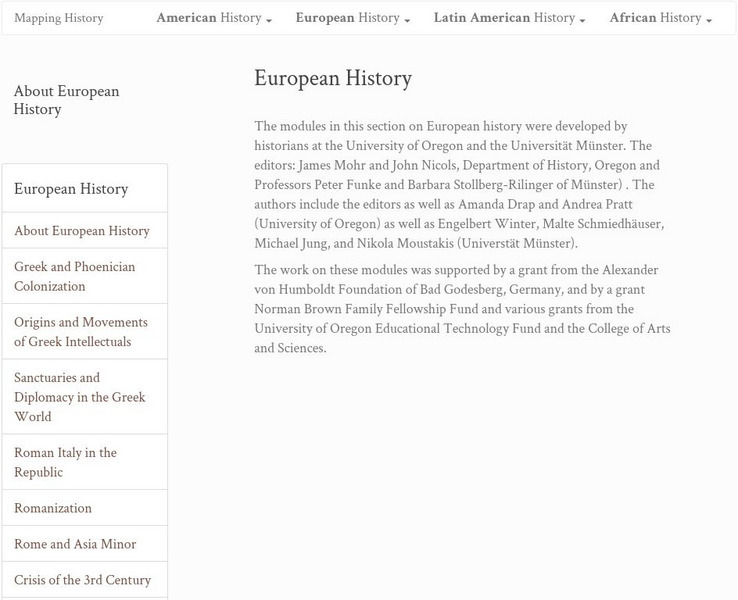University at Buffalo
University of Buffalo: Maecenas, Images of Ancient Greece and Rome: Colosseum
This site is an archive of 20 photographs taken of the Colosseum of Rome. Both exterior and interior photos.
Sophia Learning
Sophia: Principles of u.s. Government
Tutorial presents an introduction to the principles of the United States democratic government highlighting the differences and similarities between Roman and U.S. governments.
University of Oregon
Mapping History: European History
Interactive and animated maps and timelines of historical events and time periods in European history from Greek and Phoenician colonization up to the 20th century.
Curated OER
Educational Technology Clearinghouse: Clip Art Etc: Griffin
In heraldry, the griffin is a fabulous animal, with the head and forefeet of an eagle, and the body, hind legs, and tail of a lion. The head is represented with pricked ears, symbolical of its vigilance. In mythology, the griffin was a...
Curated OER
Unesco: Greece: Pythagoreion and Heraion of Samos
Many civilizations have inhabited this small Aegean island, near Asia Minor, since the 3rd millennium B.C. The remains of Pythagoreion, an ancient fortified port with Greek and Roman monuments and a spectacular tunnel-aqueduct, as well...
Other
The Stoa Consortium: Arch of Hadrian
The Arch of Hadrian was erected in honor of the Roman emperor Hadrian in the 2nd century A.D (and probably a little before 131/132 A.D. when we know Hadrian visited Athens). The arch was built over the line of an ancient road that led...
Curated OER
Educational Technology Clearinghouse: Clip Art Etc: Bracae
Trowsers, pantaloons, were common to all the nations which encircled the Greek and Roman population, extending from the Indian to the Atlantic ocean, but were not worn by the Greeks and Romans themselves. Accordingly the monuments...
Curated OER
Educational Technology Clearinghouse: Clip Art Etc: Calceus
A shoe or boot, anything adapted to cover and preserve the feet in walking. The use of shoes was by no means universal amount the Greeks and Romans. The Homeric heroes are represented without shoes when armed for battle. Socrates,...
Curated OER
Educational Technology Clearinghouse: Clip Art Etc: Clipeus
The large shield worn by the Greeks and Romans, which was originally of the circular form, and is said to have been first used by Proetus and Acrisius or Argos, and therefore is called clipeus Argolicus, and likened to the sun. But the...
Curated OER
Educational Technology Clearinghouse: Clip Art Etc: Clipeus
The large shield worn by the Greeks and Romans, which was originally of the circular form, and is said to have been first used by Proetus and Acrisius or Argos, and therefore is called clipeus Argolicus, and likened to the sun. But the...
Curated OER
Educational Technology Clearinghouse: Clip Art Etc: Persona
A mask. Masks were worn by Greek and Roman actors in nearly all dramatic representations. This custom arose undoubtedly from the practice of smearing the face with certain juices and colours, and of appearing in disguise, at the...
Curated OER
Educational Technology Clearinghouse: Clip Art Etc: Persona
A mask. Masks were worn by Greek and Roman actors in nearly all dramatic representations. This custom arose undoubtedly from the practice of smearing the face with certain juices and colours, and of appearing in disguise, at the...
Curated OER
Educational Technology Clearinghouse: Clip Art Etc: Clavis
A key. The key was used in very early times, and was probably introduced into Greece from Egypt; although Eustathius states, that in early times all fastenings were made by chains, and that keys were comparatively of a much later...
Curated OER
Educational Technology Clearinghouse: Clip Art Etc: Lectica
Lectica was a kind of couch or litter, in which persons, in a lying position, were carried from one place to another. They were used for carrying the dead as well as the living. The Greek lectica consisted of a bed or mattress, and a...
Curated OER
Educational Technology Clearinghouse: Clip Art Etc: Arcus
The bow used for shooting arrows, is one of the most ancient of all weapons, but is characteristic of Asia rather than of Europe. In the Roman armies it was scarcely ever employed except by auxiliaries; and these auxiliaries, called...
Curated OER
Educational Technology Clearinghouse: Clip Art Etc: Arcus
The bow used for shooting arrows, is one of the most ancient of all weapons, but is characteristic of Asia rather than of Europe. In the Roman armies it was scarcely ever employed except by auxiliaries; and these auxiliaries, called...
Curated OER
Educational Technology Clearinghouse: Clip Art Etc: Arcus
The bow used for shooting arrows, is one of the most ancient of all weapons, but is characteristic of Asia rather than of Europe. In the Roman armies it was scarcely ever employed except by auxiliaries; and these auxiliaries, called...
Curated OER
Educational Technology Clearinghouse: Clip Art Etc: Liber
The most common material on which books were written by the Greeks and Romans, was the thin coats or rind of the Egyptian papyrus. This plant was called by the Egyptians Byblos. The papyrus tree grows in swamps to the height of ten feet...
Curated OER
Educational Technology Clearinghouse: Clip Art Etc: Lucerna
An oil lamp. The Greeks and Romans originally used candles; but in later times candles were chiefly confined to the houses of the lower classes. A great number of ancient lamps has come down to us; the greater part of which are made of...
Curated OER
Educational Technology Clearinghouse: Clip Art Etc: Lucerna
An oil lamp. The Greeks and Romans originally used candles; but in later times candles were chiefly confined to the houses of the lower classes. A great number of ancient lamps has come down to us; the greater part of which are made of...
Curated OER
Educational Technology Clearinghouse: Clip Art Etc: Palla
The palla, as well as the pallium and palliolum, was always a rectangular piece of cloth, exactly, or, at least, nearly square. It was, indeed, used in the very form in which it was taken from the loom, being made entirely by the weaver....
Curated OER
Educational Technology Clearinghouse: Clip Art Etc: Pileus
Any piece of felt; more especially, a skull-cap of felt, a hat. These seems no reason to doubt that felting is a more ancient invention than weaving, not that both of these arts came into Europe from Asia. From the Greeks, who were...
Curated OER
Educational Technology Clearinghouse: Clip Art Etc: Gladiators
This illustration shows various types of gladiators, each type with with his specific weapons attributed to him. Gladiators were swordsmen whose profession was to fight for the public amusement. Gladiators are said to have been borrowed...
Curated OER
Educational Technology Clearinghouse: Clip Art Etc: Cyathus
A Greek and Roman liquid measure, containing one-twelfth of the sextarius, or .0825 of a pint English. The form of the cyathus used at banquets was that of a small ladle, by means of which the wine was conveyed into the drinking-cups...



